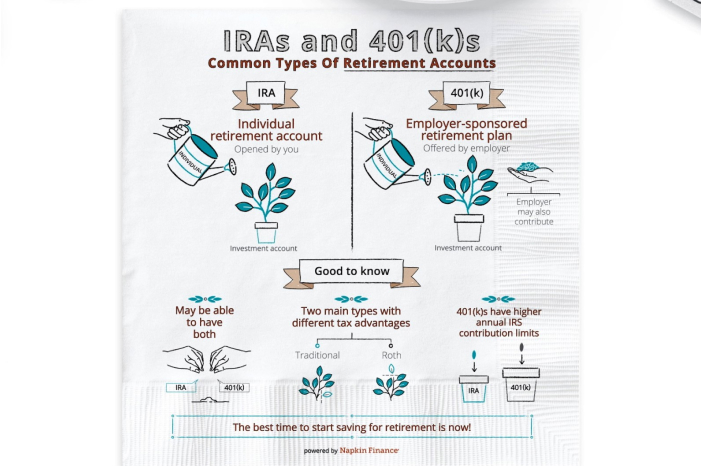
Already have a J.P. Morgan IRA? Keep an eye on your investments and review your portfolio to help you reach your goals.

An IRA is a tax-advantaged account that helps individuals save for retirement.
An IRA is for individuals with taxable compensation who are planning for retirement.
The tax advantages of an IRA may make it a smart way to save for your future.
Your contributions may be tax-deductible . Your earnings, if any, are tax-deferred and will be included in your taxable income at the time of withdrawal.
Your contributions are not tax-deductible . Your earnings, if any, are tax-deferred and may be withdrawn tax-free if certain conditions are met.
Traditional and Roth IRAs both offer a way to save for retirement that give you tax advantages.
A Traditional IRA is an individual retirement account where your contributions may be tax-deductible, and you pay taxes when you withdraw your money. Potential earnings grow tax-deferred until withdrawal.
Traditional IRAs are subject to the IRS’ required minimum distribution (RMD) rules. For individuals age 73 and older, who have a Traditional IRA, RMDs must begin by April 1 of the year following the year you turn 73 and must be taken by December 31 of each year after the year you turn age 73.
A Roth IRA is an individual retirement account where you contribute after-tax dollars, and you don’t have to pay federal tax on “qualified distributions,” including potential earnings, if certain criteria are met. Roth IRAs of original account owners are not subject to the IRS’ RMD rules.

Build your investment portfolio on your own with unlimited $0 commission online trades. Footnote 1 Opens overlay
Build your investment portfolio on your own with unlimited $0 commission online trades. Footnote 1 Opens overlay
Work 1:1 with a J.P. Morgan advisor to receive tailored guidance and build a financial strategy based on what’s important to you.
Work 1:1 with a J.P. Morgan advisor to receive tailored guidance and build a financial strategy based on what’s important to you.

Make a one-time contribution or set up recurring transfers—from your Chase checking or savings accounts into your IRA.

Tap into convenience and security on the go. Fund and manage your IRAs—from almost anywhere.

J.P. Morgan Wealth Plan℠ is our award-winning digital money coach that makes it easy to set and track your retirement goals and offers insights to guide you, every step of the way.
Explore rolling over your 401(k) from a former employer into a J.P. Morgan IRA.
Wherever you are in your retirement planning journey, there’s always a best next step. Explore our retirement guides and get a sense of what those steps might be.
Use this calculator to compare a Traditional and Roth IRA to a general investment account to see how your money can potentially grow over time.
What does IRA stand for?
IRA stands for individual retirement account, which is distinct from a workplace retirement account, such as a 401(k).
An individual retirement account, or IRA, is a tax-advantaged way of saving for retirement. A company's 401(k) may not be enough to help you reach your financial milestones, so also contributing to an IRA can help bring you closer to your retirement goals. The two main types of IRAs are Traditional and Roth.
What’s the max IRA contribution I can make in a year?
The IRS sets annual contribution limits for Roth IRAs and Traditional IRAs. For 2024, the annual maximum is $7,000 if you are under the age of 50, or $8,000 if you are 50 or above. Learn more.
Note that you may be able to contribute to both an IRA and your company’s 401(k) or other employer sponsored retirement account.
How much do I need to retire?
How much you need to retire depends on many factors including when you retire and your expected cost of living, so it’s often a good idea to work with a financial professional to help determine how much you may need. You can also use our helpful retirement calculator to estimate your future savings.

Traditional and Roth IRAs are similar in many ways, but they also have some key differences related to eligibility, required minimum distributions (RMDs) and what tax advantages they offer.

Check out these four ways to help maximize your retirement savings with your IRA.

Contributing to a retirement account can help you work toward your goals and may provide tax advantages to boost your progress.
Deductibility may be limited if you (or your spouse, if you are married) are covered by a retirement plan at work and your income exceeds certain levels. Please refer to the IRS website for applicable limits: http://www.irs.gov/retirement-plans/ira-deduction-limits.
You cannot deduct contributions to a Roth IRA. Your Roth IRA contribution may be limited based on your filing status and income. Please refer to the IRS website for applicable limits: http://www.irs.gov/retirement-plans/ira-deduction-limits.
Qualified distribution is any payment or distribution from your Roth IRA that meets the following requirements: 1) It is made after the 5-year period beginning with the first taxable year for which a contribution was made to a Roth IRA set up for your benefit, and 2) The payment or distribution is: a) Made on or after the date you reach age 59½, b) Made because you are disabled, c) Made to a beneficiary or to your estate after your death, or d) One that meets the requirements listed for first home purchase up to a $10,000 lifetime limit. Please refer to IRS Publication 590-B for more information.
Commission-free online trades apply to trading in U.S.-listed stocks, exchange-traded funds (ETFs) and options. Options trades are subject to a $0.65 per-contract fee. Sales are subject to a regulatory transaction fee of between $0.01 and $0.03 per $1,000 of principal. There are costs associated with owning certain investments, including mutual funds and ETFs. Offer terms and pricing are subject to change and/or termination. Other fees and restrictions (including account types) apply. See chase.com/online-investing-pricing for terms and conditions.
IMPORTANT: The projections or other information generated by Wealth Plan regarding the likelihood of various investment outcomes are hypothetical in nature, do not reflect actual investment results and are not guarantees of future results. Results may vary with each use and over time.
StockBrokers.com Annual Awards winners (Published 23 January 2024) are selected by StockBrokers.com’s editorial team, who evaluated the nominations based on measurable, data-driven criteria. Companies do not pay a fee to be considered for the awards. Study conducted between [September 2023 - November 2023]. For more information, visit https://www.stockbrokers.com/how-we-test.
LEARN MORE ABOUT OUR FIRM AND INVESTMENT PROFESSIONALS AT FINRA BROKERCHECK.
To learn more about J. P. Morgan’s investment business, including our accounts, products and services, as well as our relationship with you, please review our J.P. Morgan Securities LLC Form CRS (PDF) and Guide to Investment Services and Brokerage Products.
Investing involves market risk, including possible loss of principal, and there is no guarantee that investment objectives will be achieved. Past performance is not a guarantee of future results.
JPMorgan Chase and its affiliates do not provide tax, legal or accounting advice. This material has been prepared for informational purposes only, and is not intended to provide, and should not be relied on for tax, legal or accounting advice. You should consult your personal tax, legal and accounting advisors for advice before engaging in any transaction.
Asset allocation/diversification does not guarantee a profit or protect against a loss.
Bank deposit accounts, such as checking and savings, may be subject to approval, credit card and home lending products are offered by JP Morgan Chase Bank N.A. Member FDIC.
Chase Mobile ® app is available for select mobile devices. Enroll in Chase Online℠ or on the Chase Mobile ® app. Message and data rates may apply.
J.P. Morgan Wealth Management is a business of JPMorgan Chase & Co., which offers investment products and services through J.P. Morgan Securities LLC (JPMS), a registered broker-dealer and investment adviser, member FINRA and SIPC. Insurance products are made available through Chase Insurance Agency, Inc. (CIA), a licensed insurance agency, doing business as Chase Insurance Agency Services, Inc. in Florida. Certain custody and other services are provided by JPMorgan Chase Bank, N.A. (JPMCB). JPMS, CIA and JPMCB are affiliated companies under the common control of JPMorgan Chase & Co. Products not available in all states.
INVESTMENT AND INSURANCE PRODUCTS ARE: